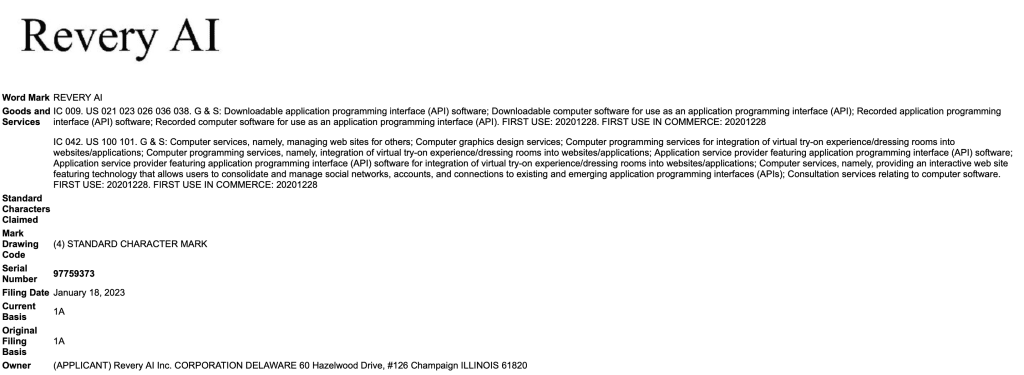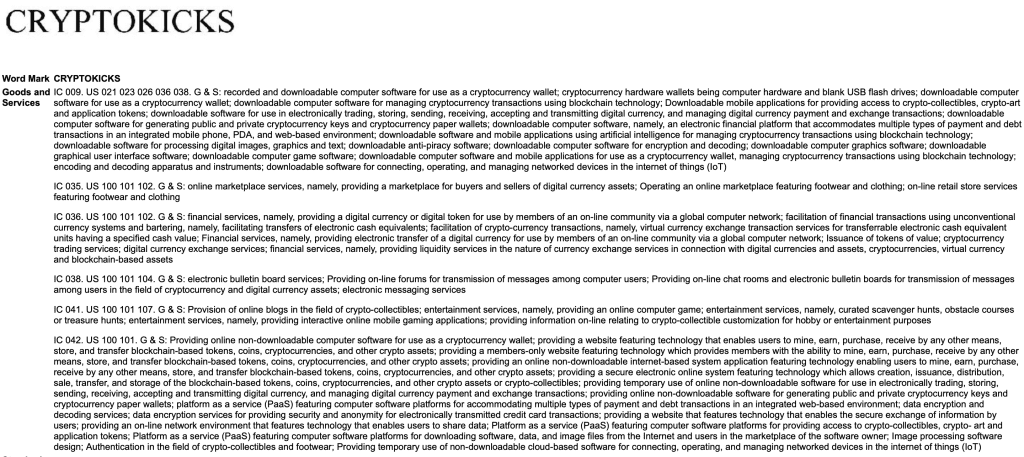Deep Dives
Applications for registration for trademarks in the realm of artificial intelligence (”AI”) are on the rise. The number of AI-centric applications lodged with the U.S. Patent and Trademark Office (“USPTO”), alone, rose from just 53 in 2012 to 5235 in 2022, according to recent data from trademark and copyright firm Neer McD PLLC, which tallied the number of applications over the past decade that specificlly list AI among the goods/services. The number spiked in 2021 – when 5439 AI-related applications were filed with the USPTO – before falling a bit in 2022. It is expected to rise in 2023, as retail companies broadly look to improve their operations – from customer service to predicting sales by product and geography.
At the same time, we are also seeing an increase in applications for registration that include “AI” in the marks, themselves. Some examples: KICKS AI (for use on apparel and footwear), AI FASHION (for “online retail store services featuring downloadable digital clothing, accessories, and collectibles authenticated by NFTs), Ai.NYC (for the “organization of events, exhibitions, fairs and shows for commercial, promotional and advertising purposes”), and CHAT AI (for “downloadable middleware for accessing an artificial intelligence system based on a language model”).
Against this background, a rising number of retail-centric AI trademark applications for registration have been lodged with the USPTO over the past few years, shedding some early light on how companies are framing their use (or in many cases, intended use) of these marks, how USPTO examiners are responding, and what we can likely expect from others as AI continues to draw the attention of companies, investors and consumers, alike. One application for registration worth noting comes from Sizekick, a German startup that is looking to help cut down on returns in the fashion e-commerce space by providing AI and computer vision tech-driven sizing. The company filed an application with the USPTO in Nov. 2022 for its name for use in what will presumably be among the “quintessential” AI-related classes of goods/services …
Class 9: Virtual reality models; data and image processing software for making 3D models; software for generating virtual images; computer e-commerce software; web application software; artificial intelligence software;
Class 35: Online retail services relating to clothing; provision of space on websites for advertising goods & services; on-line promotion of computer networks & websites; affiliate marketing; marketing the goods & services of others; automated data processing; and
Class 42: Design and development of computer hardware and software; advice and development services relating to computer software; providing temporary use of non-downloadable software; providing temporary use of web-based software; software as a service [saas] services featuring software for machine learning, deep learning & deep neural networks.
More recently, Revery AI filed an application for its name for use on “computer programming services for integration of virtual try-on experience/dressing rooms into websites/applications,” etc. in Class 42. And NON-FUNGIBLE COUTURES, INC. d/b/a Fashion Icons lodged an application for registration with the USPTO for “AI FASHION” for use in connection with “online retail store services featuring downloadable digital clothing, accessories & collectibles authenticated by NFTs” (Class 35) on an intent-to-use basis.

These and other recently filed applications – which can be found on our newly created tracker of applications for AI marks – join earlier applications that specifically cite AI as a service, such as the one that resale platform Vinted lodged with the USPTO back in April 2022 for “platforms for artificial intelligence as SAAS” (in Class 42), among other goods/services. That application is still pending before the USPTO, with an examining attorney issuing an Office action in June 2022, in which it called on Vinted to clarify various goods/services, including “platforms for artificial intelligence as software as a service,” which the examiner said are “not clear and must be clarified.” In its Feb. 17 response, counsel for Vinted edited this language to read “creation of platforms for artificial intelligence as software as a service.”
Beyond that, a handful of fragrance companies, including Byredo and Diptyque, logged applications with the USPTO last year for their names for use in connection with “AI software” in Class 9.
Finally, Nike filed an application for registration back in April 2019 for CRYPTOKICKS for use in connection with “downloadable software and mobile applications using artificial intelligence for managing cryptocurrency transactions using blockchain technology,” among other goods/services. After clarifying certain language about the goods/services at issue, Nike was granted a notice of allowance for the mark in April 2020, but has not yet filed a statement of use. (Among the language in need of clarification: “Downloadable software and mobile applications using AI” (in Class 9), which the examiner viewed as being “unacceptable as indefinite.” Nike has since modified it to extend to: “Downloadable software and mobile applications using AI for managing cryptocurrency transactions using blockchain technology.”)

To some extent, the rise in AI-related marks may mirror the push by companies to seek out registrations for their marks for use on NFTs and/or digital goods over the past few years (which was driven, at least in part, by companies’ uncertainty as to how courts and the USPTO would treat their existing “real world” trademark rights (and registrations) in the virtual world). According to data released this summer, 4,049 “NFT-related” trademark applications for registration – and 2,717 applications for virtual goods/services – were filed with the USPTO between January 1 and May 31, 2022 by brands ranging from retail titans like Walmart to famed luxury goods brands. (As indicated in TFL’s running list of metaverse marks, Valentino, Fenty, Versace, Chrome Hearts, Saint Laurent, Levi’s, Audemars Piguet, Burberry, and Bulgari are among some of the many fashion/luxury brands that filed trademark applications that seemed to suggest impending metaverse endeavors.)
As of now, we are not seeing quite the same rush by existing brands to file AI-specific applications for registration (in many cases, for their well-established marks) as we did with the striking uptick in NFT and metaverse-related applications.
However, that does not mean that companies are not looking to benefit from the hype around AI – both from a branding and brand positioning point of view. “A sea of companies are adding ‘AI’ to their taglines and pitch decks, seeking to bask in the reflected glow of the hype cycle,” Bloomberg reported recently in connection with the overarching shift from web3 to AI that is currently underway in Silicon Valley. “Last year, a ton of companies that could not raise [funds] were baptizing themselves as web3 crypto companies,” Niko Bonatsos, an investor at the venture capital firm General Catalyst, told the publication. Now he says that “the same is happening now with AI.” And to bring things full circle, at least some of the branding and/or rebranding is being helped along by AI; New York-based design agency &Walsh used AI image-generator DALL-E to help bring the branding for climate non-profit Isodope “to life.”
Many companies are also starting to tout their embrace of AI by way of consumer-facing messaging, with Chinese e-commerce giant SECOO Group, for example, announcing this month that it will be among the first companies to use ERNIE Bot, the Baidu-developed chatbot that is being called “the Chinese version of ChatGPT.” SECOO Group says that it will “apply Baidu’s leading intelligent dialogue technology to the field of luxury smart marketing” in what will be “the first landing of the dialogic language model technology in the domestic luxury smart marketing scene, as well as the priority of SECOO Group to gain the support of leading AI technology.”
Even more broadly, companies – from fashion brands to automakers – do not seem to be immune to the desire to tap into the various benefits tied to AI. In a report last year, McKinsey stated that “the operational potential of technology is becoming ever more apparent,” with fashion companies that embed AI into their businesses models now – in order to “enable new logistics and sales-fulfillment options (such as click-and-collect and drive-through), fuel innovative ways of customer acquisition, help predict and manage inventory to create a more resilient supply chain,” etc. – standing to see “a 118% cumulative increase in cash flow by 2030.” On the other hand, the consultancy stated that companies that “are slower to invest in digital technology will lag behind, and could see a 23% relative decline.”
Chances are, more trademark developments will follow from the enduring embrace of AI tech in fashion and beyond.